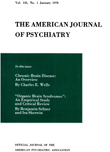THE FAMILY ENVIRONMENT OF SCHIZOPHRENIC PATIENTS
Abstract
The case histories of a series of 50 patients who had become manifestly schizophrenic prior to the age of 21 were studied to evaluate the nature of their family environment. Twenty had lost a parent by death or separation prior to their 19th birthday; in 9 cases (possibly 10) this loss was due to the serious emotional illness of one parent. Twenty of the 33 for whom there were adequate data had parents who were clearly incompatible. Twenty-three had at least one parent who was grossly unstable. Eighteen patients had been raised in a manner which was clearly bizarre or deleterious according to conventional standards. Only 5 of the 50 patients could be considered to have been raised in homes that seemed reasonably favorable and which contained 2 stable and compatible parents until the patient was 18 years old. The large majority were impeded by multiple deleterious influences which were chronically present or frequently recurrent. The paternal influence, according to this gross evaluation, was harmful as frequently as the maternal. The implications for the further study of the etiology of schizophrenia are discussed.
Access content
To read the fulltext, please use one of the options below to sign in or purchase access.- Personal login
- Institutional Login
- Sign in via OpenAthens
- Register for access
-
Please login/register if you wish to pair your device and check access availability.
Not a subscriber?
PsychiatryOnline subscription options offer access to the DSM-5 library, books, journals, CME, and patient resources. This all-in-one virtual library provides psychiatrists and mental health professionals with key resources for diagnosis, treatment, research, and professional development.
Need more help? PsychiatryOnline Customer Service may be reached by emailing [email protected] or by calling 800-368-5777 (in the U.S.) or 703-907-7322 (outside the U.S.).



